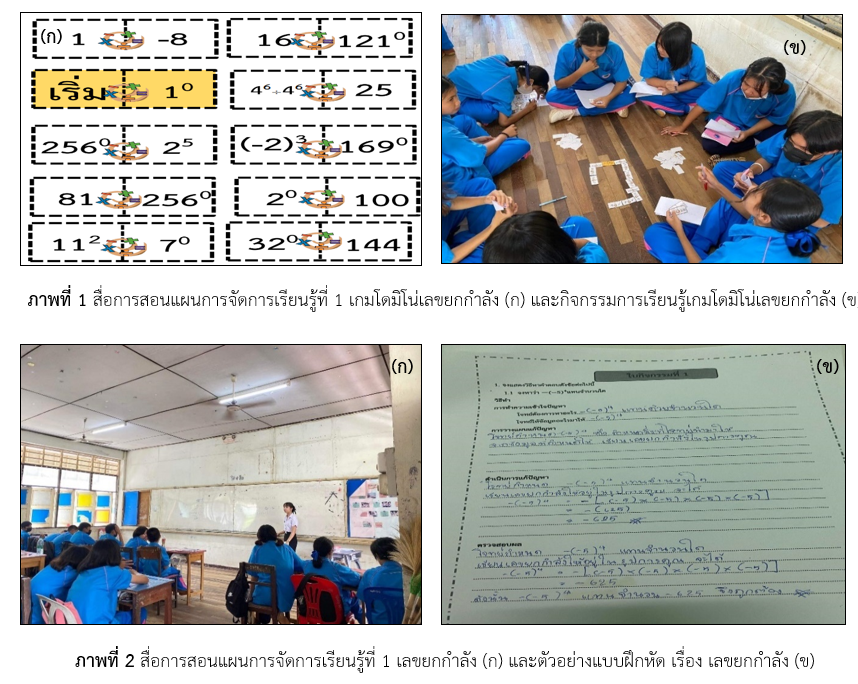การพัฒนาผลสัมฤทธิ์ทางการเรียนวิชาคณิตศาสตร์ เรื่องเลขยกกำลัง ของนักเรียนชั้นมัธยมศึกษาปีที่ 1 โดยใช้การจัดการเรียนรู้แบบ SSCS ร่วมกับเทคนิคเพื่อนคู่คิด
Main Article Content
บทคัดย่อ
การวิจัยครั้งนี้มีวัตถุประสงค์เพื่อ 1) พัฒนาผลสัมฤทธิ์ทางการเรียนคณิตศาสตร์ เรื่อง เลขยกกำลัง ของนักเรียนชั้นมัธยมศึกษาปีที่ 1 โดยใช้การจัดการเรียนรู้แบบ SSCS ร่วมกับเทคนิคเพื่อนคู่คิดเทียบกับเกณฑ์ร้อยละ 70 2) เปรียบเทียบผลสัมฤทธิ์ทางการเรียนก่อนและหลังการจัดการเรียนรู้โดยใช้การจัดการเรียนรู้แบบ SSCS ร่วมกับเทคนิคเพื่อนคู่คิด และ 3) ศึกษาความพึงพอใจของนักเรียนที่ต่อการจัดการเรียนรู้โดยใช้การจัดการเรียนรู้แบบ SSCS ร่วมกับเทคนิคเพื่อนคู่คิด กลุ่มตัวอย่างที่ใช้ในการทำวิจัย ได้แก่ นักเรียนชั้นมัธยมศึกษาปีที่ 1 ที่กำลังศึกษาในภาคเรียนที่ 1 ปีการศึกษา 2566 โรงเรียนเขาวงพิทยาคาร อำเภอเขาวง จังหวัดกาฬสินธุ์ จำนวน 1 ห้องเรียน รวม 32 คน ซึ่งได้มาจากการสุ่มแบบกลุ่ม เครื่องมือที่ใช้ในการวิจัย คือ แผนการจัดการเรียนรู้ แบบทดสอบวัดผลสัมฤทธิ์ทางการเรียน แบบสอบถามวัดความพึงพอใจ สถิติที่ใช้ในการวิเคราะห์ข้อมูล ได้แก่ ค่าเฉลี่ย ค่าเบี่ยงเบนมาตรฐาน ค่าร้อยละ การทดสอบสมมติฐานโดยใช้สถิติ (t-test) ผลการวิจัยพบว่า 1) ผลสัมฤทธิ์ทางการเรียนคณิตศาสตร์ เรื่อง เลขยกกำลัง ของนักเรียนชั้นมัธยมศึกษาปีที่ 1 หลังใช้การจัดการเรียนรู้แบบ SSCS ร่วมกับเทคนิคเพื่อนคู่คิดสูงกว่าเกณฑ์ร้อยละ 70 อย่างมีนัยสำคัญทางสถิติที่ระดับ .05 2) ผลสัมฤทธิ์ทางการเรียนหลังเรียนสูงกว่าก่อนเรียนอย่างมีนัยสำคัญทางสถิติที่ระดับ .05 3) ความพึงพอใจของนักเรียนที่มีต่อการจัดการเรียนรู้แบบ SSCS ร่วมกับเทคนิคเพื่อนคู่คิด มีค่าเฉลี่ย เท่ากับ 4.31 ซึ่งอยู่ในระดับมาก
Article Details

อนุญาตภายใต้เงื่อนไข Creative Commons Attribution-NonCommercial-NoDerivatives 4.0 International License.
วารสารวิทยาศาสตร์และวิทยาศาสตร์ศึกษา (JSSE) เป็นผู้ถือลิสิทธิ์บทความทุกบทความที่เผยแพร่ใน JSSE นี้ ทั้งนี้ ผู้เขียนจะต้องส่งแบบโอนลิขสิทธิ์บทความฉบับที่มีรายมือชื่อของผู้เขียนหลักหรือผู้ที่ได้รับมอบอำนาจแทนผู้เขียนทุกนให้กับ JSSE ก่อนที่บทความจะมีการเผยแพร่ผ่านเว็บไซต์ของวารสาร
แบบโอนลิขสิทธิ์บทความ (Copyright Transfer Form)
ทางวารสาร JSSE ได้กำหนดให้มีการกรอกแบบโอนลิขสิทธิ์บทความให้ครบถ้วนและส่งมายังกองบรรณาธิการในข้อมูลเสริม (supplementary data) พร้อมกับนิพนธ์ต้นฉบับ (manuscript) ที่ส่งมาขอรับการตีพิมพ์ ทั้งนี้ ผู้เขียนหลัก (corresponding authors) หรือผู้รับมอบอำนาจ (ในฐานะตัวแทนของผู้เขียนทุกคน) สามารถดำเนินการโอนลิขสิทธิ์บทความแทนผู้เขียนทั้งหมดได้ ซึ่งสามารถอัพโหลดไฟล์บทความต้นฉบับ (Manuscript) และไฟล์แบบโอนลิขสิทธิ์บทความ (Copyright Transfer Form) ในเมนู “Upload Submission” ดังนี้
1. อัพโหลดไฟล์บทความต้นฉบับ (Manuscript) ในเมนูย่อย Article Component > Article Text
2. อัพโหลดไฟล์แบบโอนลิขสิทธิ์บทความ (Copyright Transfer Form) ในเมนูย่อย Article Component > Other
ดาวน์โหลด ไฟล์แบบโอนลิขสิทธิ์บทความ (Copyright Transfer Form)
เอกสารอ้างอิง
Chobiad, J. (2018). Development of teaching and learning activities that strengthen the ability to give statistical reasons through solving problems of students in the special classroom Mathayom III. (in Thai). Doctoral Dissertati. Bangkok: Srinakharinwirot University.
Edmonds, W. A. and Kennedy, T. D. (2017). An applied guide to research designs quantitative qualitative and mixed methods (2nd edition). Los Angeles SAGE Publications Ltd.
Institute for the Promotion of Teaching Science and Technology. (2012). Mathematics skills/processes (2nd edition) (in Thai). Bangkok: Institute for the Promotion of Teaching Science and Technology.
Kantathanawat, T. (2020). Educational psychology for student development (in Thai). Bangkok: Min Service Supply Ltd.
Kanuansin, C. (2017). Cloud-based adaptive learning system based on SSCS model for Promote creative problem solving among graduate students (in Thai). Doctoral Dissertation. Bangkok: Chulalongkorn University.
Kaphake, J. (2020). Development of mathematical problem solving skills on Prisms and cylinders using the partner technique along with mathematics games for Mathayom II students (in Thai). Master’s Thesis. Bangkok: Silpakron University.
Ministry of Education. (2017). Learning standards and indicators for mathematics learning subject groups Science and Geography in social studies subject group religion and culture (in Thai). Bangkok: Agricultural Co-operative Federation of Thailand. Ltd.
Muangprafang, M., Jansawang, N. and Somtua, T. (2016). Students opinions on teachers teaching behavior students learning behavior and learning achievement on the rate of chemical reactions of Mathayom V students who organized peer-to-pee learning activities (in Thai). Master’s Thesis. Mahasarakham: Mahasarakham rajabhat university.
National Institute of Educational Testing. (2022). basic statistics of O-Net scores academic year 2022 (in Thai). Retrieved on 13 January 2024, from NIETS: https://www.niets.or.th/th/content/view/11821
Ngaoboonmer, K. and Huntula, J. (2022). The development of analytical thinking skill through active learning by thing pair share on electric circuit at primary school level (in Thai). Journal of Education Burapha University, 33(2).
Pizzini, E. L., Shepardson D. P. and Abell, S.K. (1989). A Rationale for and Development of a problem Solving Model of Instruction in Science Education. Science Education, 73(5), 523-534
Prommanee, P. (2022). Concept of satisfaction and construction of job satisfaction questionnaire. Academic Journal of the Association of Private Higher Education Institution of Thailand (ISO), 26(1), 59- 66.
Saduakdee, S. (2022). Results of organizing mathematics learning SQRQCQ strategies together with Using problems as a basis for similarity of Mathayom III students. academic journal of the Royal Thai Naval Academy in Social Sciences Humanities Faculty of Science (in Thai). Bangkok: Chandrakasem Rajabhat University.
Thupairoh, P. (2016). Results of learning management using the SSCS format combined with the thinking partner technique. (Think-Pair-share) on ratios and percentages that affect problem-solving ability Mathematics and mathematical communication abilities of students Mathayom II (In Thai). Master’s Thesis. Bangkok: Srinakharinwirot University.
Wipasachiwin, N. (2021). Results of learning management using the SSCS format combined with the Think-Pair-Share technique on statics on the ability to solve mathematical problems and problem solving ability (in Thai). Master’s Thesis. Bangkok: Silpakorn University.


